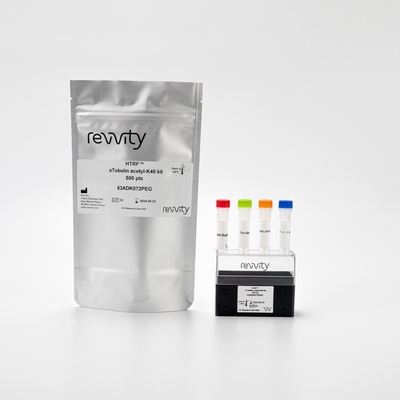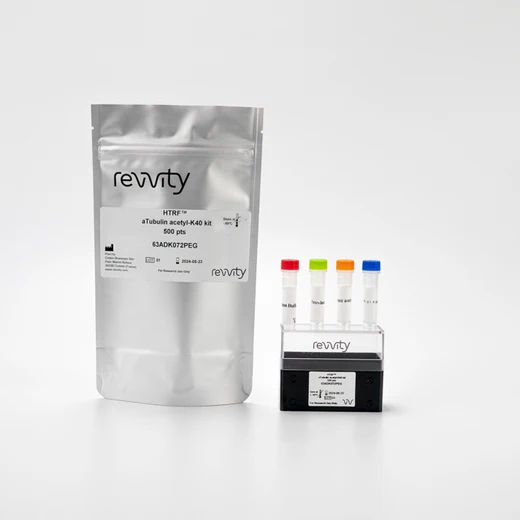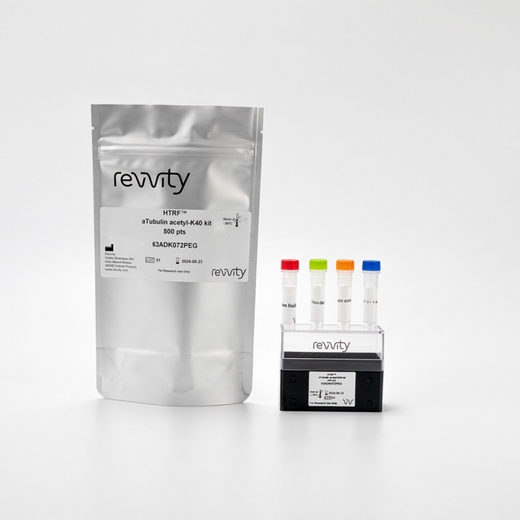

HTRF acetyl K40 α-Tubulin Detection Kit, 500 Assay Points


HTRF acetyl K40 α-Tubulin Detection Kit, 500 Assay Points






A-tubulin Acetyl-k40 Kit - 100,000 Tests
For research use only. Not for use in diagnostic procedures. All products to be used in accordance with applicable laws and regulations including without limitation, consumption and disposal requirements under European REACH regulations (EC 1907/2006).
| Feature | Specification |
|---|---|
| Application | Protein Quantification |
| Sample Volume | 16 µL |
A-tubulin Acetyl-k40 Kit - 100,000 Tests
For research use only. Not for use in diagnostic procedures. All products to be used in accordance with applicable laws and regulations including without limitation, consumption and disposal requirements under European REACH regulations (EC 1907/2006).



HTRF acetyl K40 α-Tubulin Detection Kit, 500 Assay Points



HTRF acetyl K40 α-Tubulin Detection Kit, 500 Assay Points



Product information
Overview
Alpha-Tubulin is a member of the tubulin protein superfamily, which polymerizes with the beta tubulin to form microtubules, a major component of the eukaryotic cytoskeleton. Microtubules contribute to several cellular processes, such as structural support, intracellular transport, and DNA segregation. Alpha-Tubulin K40 acetylation has been shown to affect tubulin self-assembly and protect microtubules against stress-induced material fatigue. The Alpha-Tubulin acetyl-K40 kit is designed for the quantitative detection of K40 acetylated Alpha-Tubulin in cell lysates.
Specifications
| Application |
Protein Quantification
|
|---|---|
| Brand |
HTRF
|
| Detection Modality |
HTRF
|
| Molecular Modification |
Acetylation
|
| Product Group |
Kit
|
| Sample Volume |
16 µL
|
| Shipping Conditions |
Shipped in Dry Ice
|
| Target Class |
Biomarkers
|
| Technology |
TR-FRET
|
| Therapeutic Area |
Oncology & Inflammation
|
| Unit Size |
500 Assay Points
|
Video gallery

HTRF acetyl K40 α-Tubulin Detection Kit, 500 Assay Points

HTRF acetyl K40 α-Tubulin Detection Kit, 500 Assay Points

How it works
Assay principle
Alpha-Tubulin acetyl-K40 is measured using a sandwich immunoassay involving two specific anti-alpha-Tubulin antibodies, respectively labelled with Europium Cryptate (donor) and d2 (acceptor). The intensity of the signal is proportional to the concentration of K40 acetylated alpha-Tubulin present in the sample.

Assay Protocol
The protocol for the alpha-Tubulin acetyl-K40 assay is described here. Cells are plated, stimulated, and lysed in the same 96-well culture plate. Lysates are then transferred to the assay plate for the detection of Alpha-Tubulin by HTRF reagents. This protocol enables the cells' viability and confluence to be monitored. The antibodies labelled with HTRF fluorophores may be pre-mixed and added in a single dispensing step to further streamline the assay procedure. The assay detection can be run in 96- to 384-well plates by simply resizing each addition volume proportionally.

Assay validation
TSA and tubacin effect on NIH 3T3 cells
12,500 NIH/3T3 cells were plated in 96-well plate and treated after incubation overnight for 16h with compounds at 37°C, CO2. Lysis buffer was added after supernatant removal. 30 minutes under shaking conditions permit the lysate generation and then we transferred the lysatesd to 384-well plate for detection. Trichostatin A (TSA), a potent inhibitor of histone deacetylase, and Tubacin, a selective inhibitor of HDAC6, increase the level of acetylated α –Tubulin on Lysine 40 on NIH/3T3 cells.

Resources
Are you looking for resources, click on the resource type to explore further.
This guide provides you an overview of HTRF applications in several therapeutic areas.


How can we help you?
We are here to answer your questions.






























